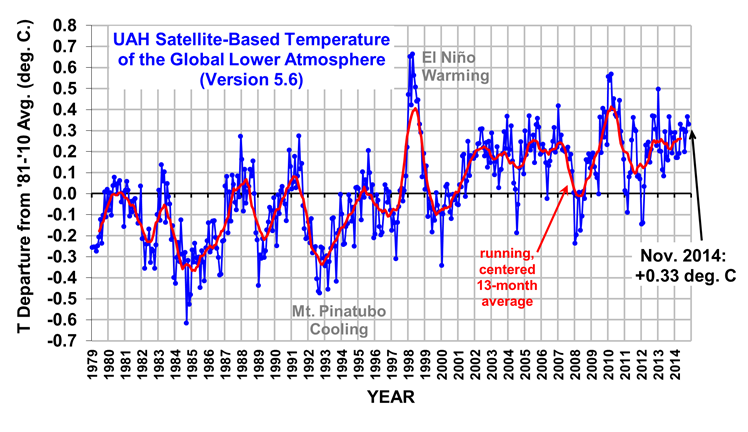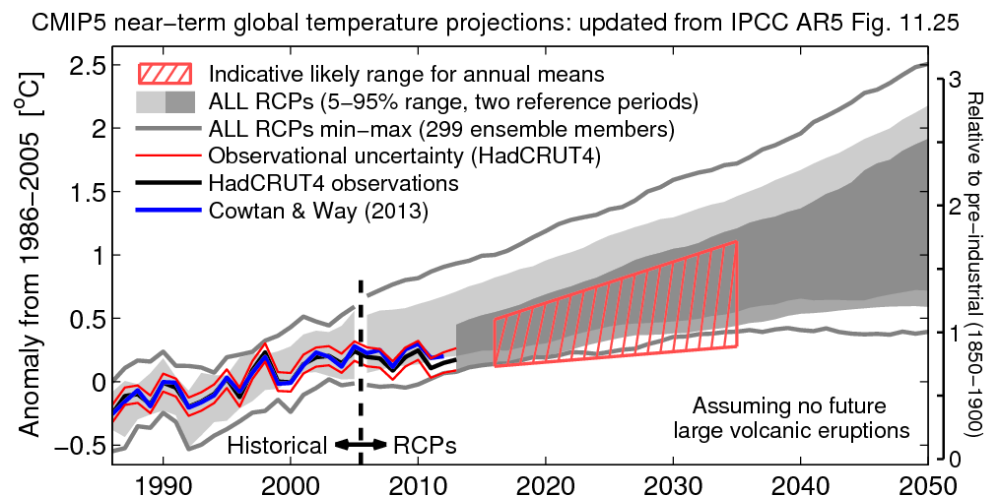“The buzz is intensifying about 2014 possibly being the warmest year globally in the historical temperature record,” notes climatologist Judith Curry, pointing to the World Meteorological Organization (WMO) press release of 3 Dec: 2014 on course to be one of the hottest, possibly hottest, on record.
Curry, scientist Roy Spencer (who gathers satellite temperature records) and authors Matt Ridley and Ezra Levant all reckon that’s spin, not science. Let’s ask them some questions…
Q: How can it be the warmest year on record when the year isn’t yet over?
Judith Curry: The year isn’t yet over, but the political conference on climate in Lima has only just started – the timing of the “warmest year on record” announcement was nothing to do with the records, which for this year won’t be complete until March 2015, and everything to do with politics.
Ezra Levant: The thousands of professional diplomats, bureaucrats and media stenographers that make up the bulk of the global warming industry are. They love these annual get-togethers. And they're almost always at an exotic, far-away location - dream vacation spots that they would never get to on their own budgets.
And almost all of them in tropical hot spots - Bali, Cancun, Rio. You'd almost think they loved global warming, especially each [northern-hemisphere winter].
Matt Ridley: The scientists of WMO allowed themselves to be used politically. Not that they were reluctant. To squeeze and cajole the data until they just crossed the line, the WMO “reanalysed” a merger of five data sets. Maybe that was legitimate but, given how the institutions that gather temperature data have twice this year been caught red-handed making poorly justified adjustments to “homogenise” and “in-fill” thermometer records in such a way as to cool down old records and warm up new ones, I have my doubts.
In one case, in Rutherglen, a town in Victoria, a recorded cooling trend of minus 0.35C became a reported warming trend of plus 1.73C after “homogenisation” by the Australian Bureau of Meteorology. It claimed the adjustment was necessary because the thermometer had moved between two fields, but could provide no evidence for this, or for why it necessitated such a drastic adjustment.
Most of the people in charge of collating temperature data are vocal in their views on climate policy, which hardly reassures the rest of us that they leave those prejudices at the laboratory door. Imagine if bankers were in charge of measuring inflation.
Q: But isn’t it still true we’re “on track” to being the warmest year?
Matt Ridley: This predicted record would be only one hundredth of a degree above 2010 and two hundredths of a degree above 2005 — with an error range of one tenth of a degree. True scientists would have said: this year is unlikely to be significantly warmer than 2010 or 2005 and left it at that.
Judith Curry: We won’t really have a good assessment on the temperatures for 2014 until about March 2015, when all of the observations have been assembled and quality controlled. The different temperature datasets and analyses give different results, which reflects the uncertainties in the data and analysis methods. Even if one or several data sets do find 2014 to be the hottest year, given the uncertainties one can only conclude that this is one of the top 5 or so warmest years.
The real issue that is of concern to me is the growing divergence between the the observed global temperature anomalies and what was predicted by climate models. Even if 2014 is somehow unambiguously the warmest year on record, this won’t do much to alleviate the growing discrepancy between climate model predictions and the observations.
Roy Spencer: Our satellite estimates of global temperature, which have much more complete geographic coverage than thermometers, reveal that 2014 won’t be even close to a record warm year.

In fact, the satellite and thermometer technologies seem to be diverging in what they are telling us in recent years, with the thermometers continuing to warm, and the satellite temperatures essentially flat-lining.
So, why have world governments chosen to rely on surface thermometers, which were never designed for high accuracy, and yet ignore their own high-tech satellite network of calibrated sensors, especially when the satellites also agree with weather balloon data?
I will leave it to the reader to answer that one…
As continual fiddling with the global surface thermometer data leads to an ever-warmer present and an ever-cooler past, many of us are increasingly skeptical that beating a previous “warmest” year by hundredths of a degree has any real-world meaning.
For a “record” temperature to be statistically significant, it has to rise above its level of measurement error, of which there are many for thermometers: relating to changes in location, instrumentation, measurement times of day, inadequate coverage of the Earth, etc. Oh…and that pesky urban heat island effect.
A couple hundredths of a degree warmer than a previous year (which 2014 will likely be) should be considered a “tie”, not a record.
Q: But, but carbon dioxide … ?
Ezra Levant: Not only is the globe not warming, but there seems to be no connection between the level of carbon dioxide in the atmosphere and temperature. It is true that global emissions of carbon dioxide are rising, mainly because of the industrialisation of Third World countries like India and China.
That is a good thing, by the way -- they have as much right to build power plants as we do, and to do so in the most reliable, cost-effective ways they can. That's why China is the world's largest producer and consumer of coal, and is embarking on the world's largest nuclear program too…
Q: But if it does turn out to be the hottest does that indicate the pause is over?
Judith Curry: One year won’t really make a difference, unless it is extremely warm. And then 2015 would need to be even warmer than 2014. So declaring the pause to be ‘over’ will require continued warming. Again, the pause itself is not of such great significance; rather it is the growing divergence between climate model predictions and the observations – one warm year isn’t going to really change this.
Q: But it’s still true that five of the warmest years on record have been in this century, or very nearly?
Judith Curry: Well, ranking 1998, 2005, 2010 and 2014 as the ‘warmest years’ seems very consistent with a plateau in surface temperatures since 1998. Even if 2014 maintains its status among the top 4, how does this impact the ‘pause’ narrative?
RealClimate, Tamino, and probably others are busy trying to convince that the pause doesn’t exist. The preferred data set for such analyses is Cowtan and Way; I am not a fan of this dataset owing to concerns about how they treat the Arctic [link]. Statistical games can be played, and you can infer that there is a pause (or not).
The real issue is the growing divergence between climate model projections and the surface temperature observations, illustrated in this diagram by Ed Hawkins:You can see that using the Cowtan and Way data set doesn’t help much with regards to the discrepancy: Cowtan and Way is within the error bars of HadCRUT4.
Updating this diagram to include 2014 is going to increase the discrepancy between the models and observations, because the climate models show an inexorable warming.
Chip Knappenberger: Speaking of Cowtan and Way…it doesn’t look like 2014 is gong to be record in their compilation. See this Tweet from Robert Way.
Q: So what’s your summary?
Judith Curry: Focussing on the ‘warmest year’ is a pointless exercise, unless the warm anomaly is as large as 1998. Focussing on the ‘pause’ is mainly significant in context of the comparison between climate model projections and surface temperatures.
Attempts to spin 2014 as a possible ‘warmest year’ is exactly that: spin designed to influence the Lima deliberations. While the WMO report was not unreasonable, their press release was a clear attempt to influence the Lima deliberations in the direction of being ‘alarmed.’
I’ll be waiting until HadCRUT and Berkeley Earth have provided their final 2014 temperature analyses (which will probably be sometime late winter). Particularly with regards to the recent temperature record and the ‘pause,’ I think more scrutiny should be given to the various reanalyses, which in principle is probably the best way to provide a truly global analysis.
Ezra Levant: Right now, China emits at least twice as much carbon dioxide as the United States; if it continues on its current course until 2030, it will triple itself again. By contrast, American emissions have been trending down for the better part of 10 years, chiefly because of the advent of fracking. That technology has made natural gas so plentiful and cheap in the United States that it has replaced coal as the fuel of choice for many American power plants. That - and not any expensive government-run plan - is why American emissions are now the lowest they've been since the early 1990s.
Fracking has reduced American carbon emissions more than any other country in the world. You'd think that would be the environmental story of the year - a great success, and from the industry itself. But to expect that would be to misunderstand the rationale and the operations of the environmentalist movement. They don't want success; they want perpetual alarm, perpetual war against industry…


3 comments:
Check my efforts Peter...
http://r1016132.wordpress.com/2014/12/08/science-says-wooly-mammoth-extict-due-to-manmade-climate-change/
Here's one of Yours Truly...
http://r1016132.wordpress.com/2014/12/06/baptism-of-fire-lifesavers-and-heartbreakers-pt1/
***Off topic so can delete, over to you Peter
The Global warming religion, is an organized Church of preachers telling us what to believe. I never thought I would despise Scientists, but I do. They actually see it as a valid idea to use propaganda and money and politics, and contrived consensus to advance the cause that benefits themselves and political agendas. . All over the world now the Media repeat the Mantra, the dinosaurs say the water will rise by a meter or more shortly, And you will not make it out of Bangkok in your car to China; the tires will sizzle on the road. It is disheartening to spend a few years reading all I can about Climate and history of the Earth, to be forced upon by this religion . You can not get a sensible argument printed in a newspaper .. What makes these people worse is the alignment with left wing politics. If only I could stop the 30,000 tonne train loads each day from Queensland to China I could save the world, and give my Nobel Peace prize to the Greens. I commend Peter Cresswell’s writing to New Zealanders, and ask that more of you, share your opinion and be written here. What is lacking in our psyche as people is a sense of the Earth’s climate evolution. I have been reading climate now for several years, and my sense of history is aligned to the study of evolution. There were pictures in the newspaper yesterday of idiots with their heads in the sand, because they know so much more than we do.
Post a Comment